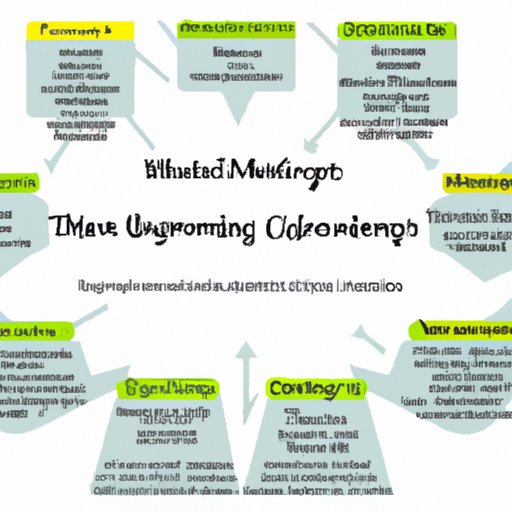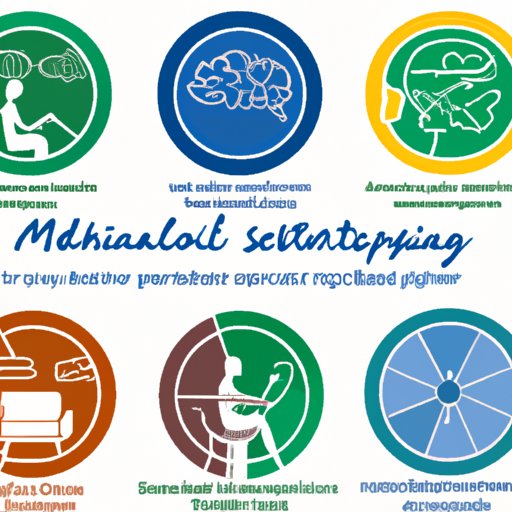Introduction
Mental health counseling is an important and rewarding profession that provides support and guidance to individuals, families, and groups who are dealing with a variety of mental health issues. Mental health counselors are responsible for helping their clients develop healthy coping skills, overcome challenges, and reach their goals. Becoming a mental health counselor requires dedication, commitment, and specialized knowledge, but the rewards of being able to help those in need can be immeasurable.
Overview of the Role of Mental Health Counselor
Mental health counselors are dedicated professionals who provide psychotherapy and counseling services to individuals, couples, families, and groups. They work with clients to identify and modify problematic behaviors and thought patterns, set personal goals, and develop healthy coping strategies. Mental health counselors also provide crisis intervention, trauma-focused interventions, and referrals for additional services. Mental health counselors often collaborate with other healthcare professionals, such as psychiatrists, psychologists, social workers, and primary care physicians, to ensure their clients receive comprehensive care.
Benefits of Working as a Mental Health Counselor
Working as a mental health counselor can be personally and professionally rewarding. Mental health counselors have the opportunity to make a positive impact on their clients’ lives by providing support and guidance during difficult times. They also have the satisfaction of knowing they are helping to reduce stigma and increase access to mental health services. Additionally, mental health counselors may find their job to be personally fulfilling, as they are able to develop meaningful and trusting relationships with their clients. Finally, mental health counselors can take advantage of flexible hours and the potential for career advancement.
Qualifications and Education Required to Become a Mental Health Counselor
There are a few basic qualifications and educational requirements that must be met in order to become a mental health counselor. In most states, mental health counselors must hold at least a master’s degree in counseling or a related field from an accredited program, as well as complete a certain number of supervised clinical hours. Additionally, mental health counselors must obtain licensure from their state’s professional licensing board.
Types of Degrees Needed
Most states require mental health counselors to hold at least a master’s degree in counseling, psychology, social work, or a related field. Some states may also accept bachelor’s degrees in these fields if the individual has completed additional coursework in counseling or psychology. It is important to check with your state’s licensing board to determine the exact educational requirements.
Licensure Requirements
In addition to holding a master’s degree, mental health counselors must also obtain a license from their state’s professional licensing board. Generally, this involves passing an exam, completing a certain number of supervised clinical hours, and submitting an application. The specific requirements vary by state, so it is important to check with your state’s licensing board to determine what is needed.
Additional Certifications and Trainings
Although not required, many mental health counselors choose to pursue additional certifications and trainings in order to stay up to date on the latest research and best practices in the field. These include certifications in specific areas such as couples counseling, substance abuse counseling, and trauma-focused interventions. Additionally, mental health counselors may pursue continuing education classes or workshops to stay abreast of the latest developments in the field.
Different Types of Mental Health Counseling Services Available
Mental health counselors offer a variety of services depending on the needs of their clients. These services can include individual therapy, group therapy, family therapy, crisis intervention, and trauma-focused interventions.
Individual Therapy
Individual therapy is one of the most common types of mental health counseling services offered. During individual therapy sessions, mental health counselors work with clients to identify and address personal issues, such as depression, anxiety, relationship problems, and grief. Mental health counselors use a variety of techniques and interventions to help their clients build self-awareness, set goals, and develop healthy coping strategies.
Group Therapy
Group therapy is another type of mental health counseling service that can be beneficial for clients. During group therapy sessions, mental health counselors facilitate interactions between a small group of clients with similar issues. Group therapy can be especially helpful for clients who are struggling with social anxiety or difficulty in forming relationships. Through group therapy, clients are able to gain insight into their own behavior and learn how to interact more effectively with others.
Family Therapy
Family therapy is a type of mental health counseling service designed to help families improve communication and strengthen relationships. During family therapy sessions, mental health counselors work with the entire family to identify conflicts, discuss issues, and develop strategies for resolving them. Family therapy can be particularly helpful for families struggling with divorce, addiction, or communication difficulties.
Crisis Intervention
Crisis intervention is a type of mental health counseling service that is used to help individuals in crisis. This can include individuals struggling with suicidal thoughts, severe depression, or post-traumatic stress disorder (PTSD). Crisis intervention focuses on providing immediate assistance, such as safety planning, emotional support, and referrals to other services. Mental health counselors may also provide follow-up care to ensure the individual is receiving the necessary support.
Trauma-Focused Interventions
Trauma-focused interventions are a type of mental health counseling service that is used to help individuals who have experienced traumatic events, such as physical or sexual abuse, natural disasters, or combat experience. During trauma-focused interventions, mental health counselors work with clients to identify triggers, develop coping strategies, and process their traumatic experiences in a safe and supportive environment.

Professional Ethics in Mental Health Counseling
Mental health counselors must adhere to a set of professional ethics when working with their clients. These ethics include codes of conduct, confidentiality and privacy, and cultural competency and diversity.
Codes of Conduct
Mental health counselors must adhere to a code of ethics established by their professional organization. These codes of conduct outline the expectations for professional behavior, such as maintaining appropriate boundaries with clients, avoiding dual relationships, and adhering to laws regarding patient confidentiality. Mental health counselors who violate these codes of conduct may face disciplinary action.
Confidentiality and Privacy
Mental health counselors are obligated to maintain the confidentiality and privacy of their clients. This means that they cannot disclose any information about their clients without their permission. Mental health counselors must also take steps to ensure their clients’ records are kept secure and confidential.
Cultural Competency and Diversity
Mental health counselors must recognize and respect the diverse backgrounds and experiences of their clients. They must strive to understand different cultures and beliefs, and be aware of any biases they may have. Mental health counselors should also be knowledgeable about the various resources available to clients from different backgrounds.

Common Interventions and Techniques Used in Mental Health Counseling
Mental health counselors use a variety of interventions and techniques to help their clients. These include cognitive behavioral therapy (CBT), dialectical behavior therapy (DBT), solution-focused therapy, motivational interviewing (MI), and mindfulness practices.
Cognitive Behavioral Therapy (CBT)
Cognitive behavioral therapy (CBT) is a type of psychotherapy that focuses on identifying and changing negative thought patterns and behaviors. CBT helps clients recognize their distorted thinking and develop new, healthier ways of thinking and behaving. Mental health counselors may use CBT as part of individual or group therapy sessions.
Dialectical Behavior Therapy (DBT)
Dialectical behavior therapy (DBT) is a type of psychotherapy that focuses on helping clients regulate their emotions, manage interpersonal relationships, and practice mindfulness. DBT incorporates techniques from cognitive behavioral therapy, as well as acceptance and commitment therapy, to help clients develop healthy coping strategies. Mental health counselors may use DBT as part of individual or group therapy sessions.
Solution-Focused Therapy
Solution-focused therapy is a type of psychotherapy that focuses on identifying and addressing problem areas in a client’s life. During solution-focused therapy sessions, mental health counselors help clients identify their goals and develop practical solutions to achieve them. Solution-focused therapy can be used as part of individual or family therapy sessions.
Motivational Interviewing (MI)
Motivational interviewing (MI) is a type of psychotherapy that focuses on helping clients identify their motivations and barriers to change. MI helps clients explore their values and goals, and develop strategies for making positive changes in their lives. Mental health counselors may use MI as part of individual or group therapy sessions.
Mindfulness Practices
Mindfulness practices are a type of psychotherapy that focuses on helping clients become more aware of their thoughts and feelings. Mindfulness practices involve focusing on the present moment and accepting one’s thoughts and emotions without judgment. Mental health counselors may incorporate mindfulness practices into individual or group therapy sessions.

Developing Effective Therapeutic Relationships with Clients
Mental health counselors must develop strong and trusting relationships with their clients in order to be effective. This includes establishing rapport, listening actively, and responding appropriately.
Establishing Rapport
Mental health counselors must establish rapport with their clients in order to create a safe and supportive environment. Establishing rapport involves building trust, demonstrating empathy, and showing respect for the client’s beliefs and values. Mental health counselors can do this by using active listening, asking open-ended questions, and providing feedback in a nonjudgmental manner.
Listening Skills
Mental health counselors must be able to listen actively and attentively to their clients. This involves paying attention to verbal and nonverbal cues, reflecting back the client’s words, and asking clarifying questions. Active listening helps mental health counselors gain a better understanding of their clients’ needs and concerns.
Responding Appropriately
Mental health counselors must be able to respond appropriately to their clients. This includes providing support and validation, offering advice only when requested, and referring clients to other services when necessary. Responding appropriately helps mental health counselors build trust and foster a collaborative relationship with their clients.

Handling Difficult Situations in Mental Health Counseling
Mental health counselors must be prepared to handle difficult situations with their clients. This involves setting boundaries, dealing with resistance, and seeking supervision when necessary.
Setting Boundaries
Mental health counselors must be able to set and maintain appropriate boundaries with their clients. This includes clearly communicating expectations, avoiding dual relationships, and protecting their own emotional wellbeing. Setting boundaries helps mental health counselors maintain a professional relationship with their clients and prevent burnout.
Dealing with Resistance
Mental health counselors must be prepared to deal with resistance from their clients. This can include refusal to participate in therapy, refusal to follow through on treatment plans, or difficulty in engaging in the therapeutic process. Mental health counselors can address resistance by remaining calm, being patient, and exploring the underlying reasons for the resistance.
Seeking Supervision
Mental health counselors must be willing to seek supervision when needed. This involves discussing challenging cases with a supervisor, getting feedback on their work, and reflecting on their own practice. Seeking supervision helps mental health counselors stay informed about best practices and remain ethical in their work.
Conclusion
Mental health counselors play an important role in providing support and guidance to individuals, families, and groups. To become a mental health counselor, individuals must meet certain qualifications and educational requirements, including obtaining a master’s degree and licensure from their state’s professional licensing board. Mental health counselors can provide a variety of services, such as individual therapy, group therapy, family therapy, crisis intervention, and trauma-focused interventions. Additionally, mental health counselors must adhere to professional ethics, such as codes of conduct, confidentiality and privacy, and cultural competency and diversity. Common interventions and techniques used in mental health counseling include cognitive behavioral therapy (CBT), dialectical behavior therapy (DBT), solution-focused therapy, motivational interviewing (MI), and mindfulness practices. Finally, mental health counselors must be able to develop effective therapeutic relationships with their clients, set boundaries, and handle difficult situations. Becoming a mental health counselor can be a rewarding and fulfilling experience.
(Note: Is this article not meeting your expectations? Do you have knowledge or insights to share? Unlock new opportunities and expand your reach by joining our authors team. Click Registration to join us and share your expertise with our readers.)
